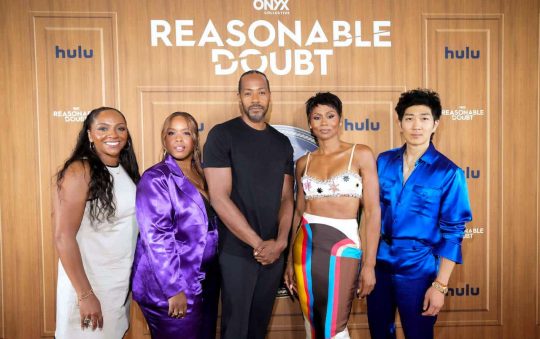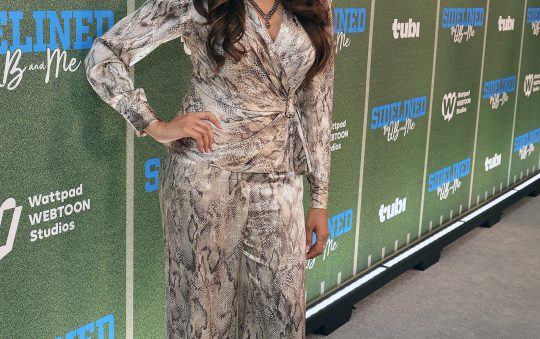L-R: Carla Renata and Ngozi Anyanwu in the world premiere of “Good Grief.” (Photo by Craig Schwartz)
In the midst of Women’s History Month, actress and playwright Ngozi Anyanwu, is premiering her award winning stage play, “Good Grief,” at Center Theatre Group’s Kirk Douglas Theatre. Anyanwu is the recipient of the coveted 2016 Humanitas/Center Theatre Group Playwriting Prize. In her semi-autobiographical piece, Anyanwu gives her audience insight into her suburban upbringing as a first generation Nigerian American. The production also addresses how she coped with the untimely death of a friend who loss his life in a car accident. In an exclusive interview with the L.A. Sentinel, Anyanwu talks about the process of seeing her vision to fruition as well as what she believes made her story transcend gender and race to win the top prize over nearly 250 applicants.
LAS: What aspect of your story do you believe most resonated with the judges of the competition?
Ngozi Anyanwu: The dual cultural aspect. I think most people are more bi-cultural than they know. My play is a very American story that people key into. The play centers around my story growing up in the suburbs which of course is a very American story and you’re sort of surprised when you find out that she has very African parents and that her very Nigerian parents shape who she is. If you’re a black or white American you can completely identify with the pressures of your parents not understanding you. Just because they have an accent, doesn’t mean you’re any different so I feel like this play is a lovely vehicle to get at the heart of the fact that actually we’re not all that different.

LAS: It’s hard to believe that this is your first solo production!
NA: This is my first full length play but I was in a group with several other first generation Nigerians including Yvonne Orji (from HBO’s “Insecure”) We wrote together but it was never full length, we wrote monologues, sketches and scenes that we performed so I’m somewhat used to writing, performing and producing. Prior to the Center Theatre Group, competition, I was acting in an HBO series. I’ve always worked on multiple projects at a time so for me it was a discipline issue of actually finishing a work by myself because I was used to mostly collaborations but the hard thing about collaborations is that you all have-to-have the same vision or you’ll have to compromise in someway to get it done. I never found that I could get a full thing done because the people I was collaborating with all had different ideas of what to do. So this was a play that was mine, you have to do what I want to do (laughs) so maybe that’s the control freak in me which led to my first play being completed.
LAS: What is it like being on the other side of seeing your vision come to fruition?
NA: It’s pretty exciting, I’m still adjusting. I think that my artistic journey has really been trying to step into something being mine and being comfortable with being in charge. Even with the leadership qualities that I do have, if someone has a problem and has to come to me, I’m anti-confrontational. So once I decided to own it, everyone followed suit. But I still have moments where my fellow actors will ask, ‘What do you think of this?’ I’m like, ‘do what you want, it’s your part now.’ And their response is, ‘but you wrote it’ and I’m like, ‘…Right! Well here are my thoughts on it.’ But I think it’s a constant negotiation because the theatre and arts are a constant collaboration so yes it’s mine, I wrote it but in order for an actor, the director or the designer to do their best work they have to have ownership over their work. I didn’t come in as a playwright and talk to the designer, I let the hierarchy stand and let the director have that conversation.
By being in the theatre industry for a while, I trust the process, I also have faith that this play will go other places so this is just the beginning of that. For me it’s really about learning through my artistic journey, it’s not about making something perfect it’s about letting everyone have ownership of their place in the process. And if everyone feels like they have a stake and if they want to fight with me over something, that’s a good position to be in because it means they care about my play, (laughs). At the same time if I felt like something wasn’t right, I would speak up. If someone doesn’t understand a line, a beat or why I wrote something they would ask me to explain it.

LAS: Oftentimes people want productions to follow a beginning, middle and end structure with a climax and resolution. For example, some would say the Oscar winning film, “Moonlight” leaves the ending open for interpretation. Does your production follow a particular format?
NA: I saw “Moonlight” three times, structures are made to be broken. My play is about grief so my thought is that it doesn’t end, I don’t think my play has an ending as far as how you get over the passing of someone you love–you don’t. You learn to live with it. There are moments when it comes back and it floods you. You’re overwhelmed by it and you can’t function then there are moments where you can actually live. I think the thing that I want people to get out of it is that it’s okay to grieve, it’s okay to completely fall apart and be nonfunctional but you won’t die from grief, if you don’t want to. If it’s painful and you can’t function it’s probably the speed you need to be at, in that moment; you’re at the right place.
LAS: What did you take away from the loss you reference in your play?
NA: I loss my friend when I was 21-years-old, he was 21 as well. He was the first person that I loss that was close to me. For this play [the take-aways are,] hold on to the people that you have while you have them because it’s going to sound cliché, but tomorrow isn’t promised.
He left very suddenly in a car accident. So be kind and be honest. A lot of the scenes in the play are moments I wish I would have had with him and the life I maybe would have had with him. So honor the time you have because who knows what tomorrow’s going to bring you.
Don’t be afraid to go through those hard moments to resolve things or be forced to have all of those unresolved issues with people. Be honest, kind and brave with the people you love because you don’t know how long you’re going to have them.
“Good Grief” plays at Center Theatre Group’s Kirk Douglas Theatre through March 26, 2017. For tickets and information, please visit CenterTheatreGroup.org or call (213) 972-4400.








